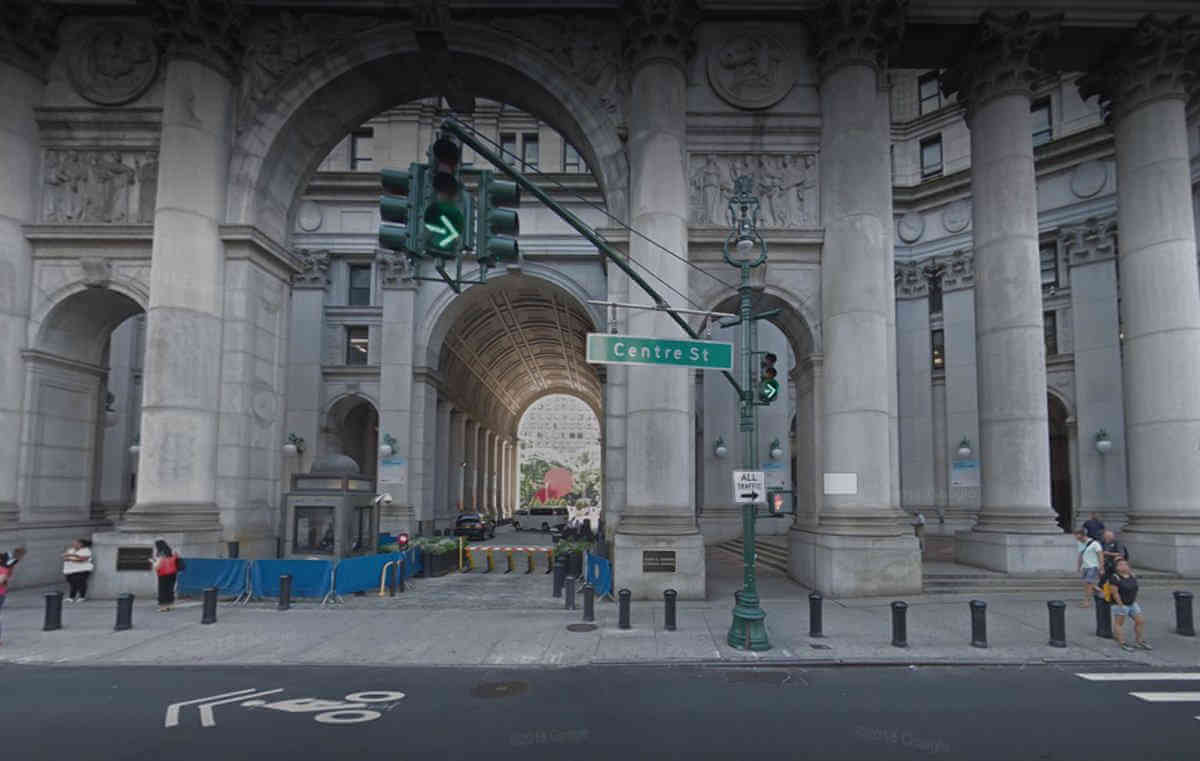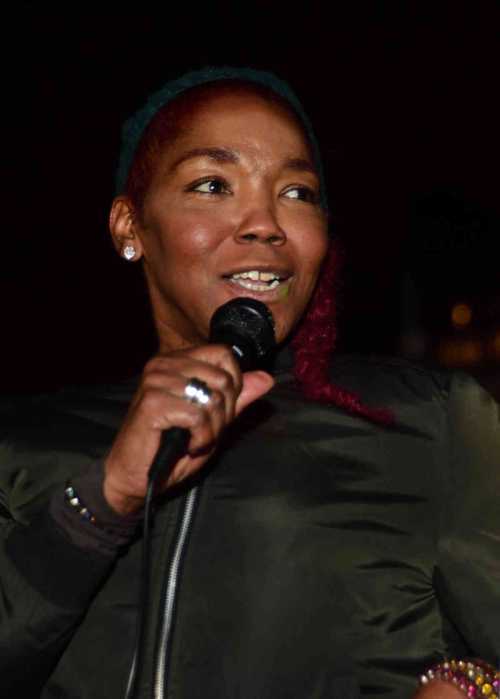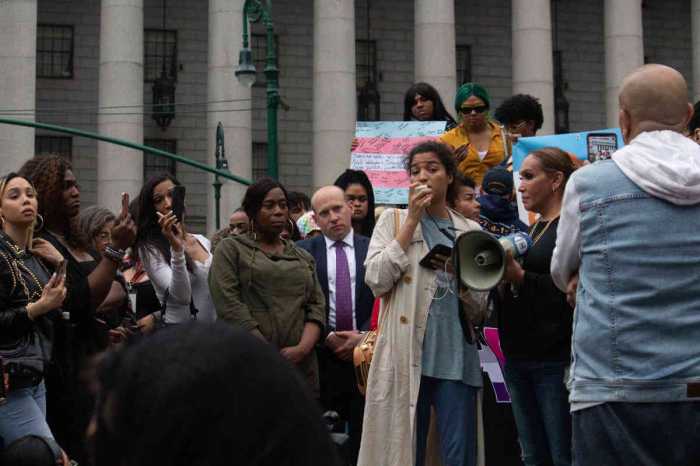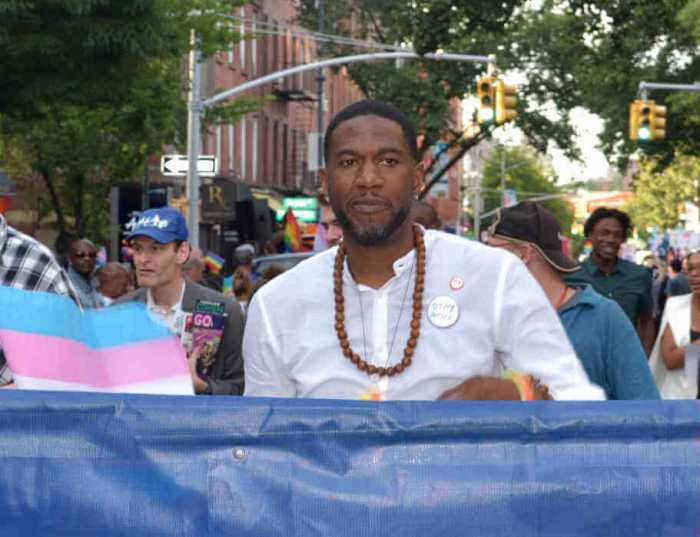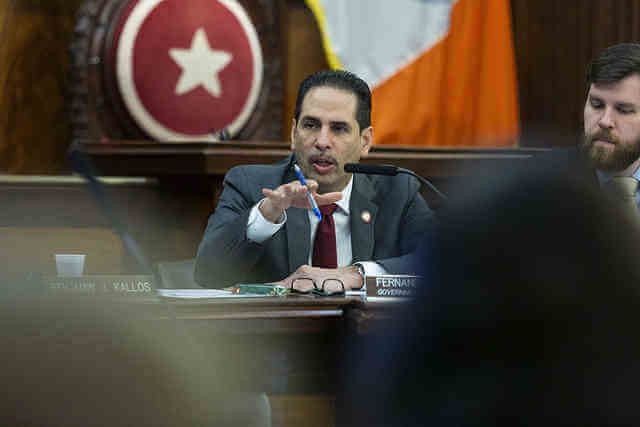As the campaign for New York City public advocate races toward a February 26 special election to replace Letitia James, who took office as state attorney general on New Year’s Day, roughly 200 people turned out to hear from eight of the candidates at the LGBT Community Center on Wednesday evening.
The vacancy has brought Melissa Mark-Viverito, the City Council speaker during Mayor Bill de Blasio’s first term, back into city politics after a stint with the Latino Victory Fund. She was the first candidate of the evening, and she filled the room in the resonant tones of a person skilled at introducing herself.
“I was raised by strong women who wanted equality and justice,” the former speaker said. “They wanted respect and I will fight for that respect for all groups.”
Then moving quickly into the heart her vision of progressive politics, Mark-Viverito said, “It is through community dialogue that we make government nimble.”
She promised to work to protect transgender women from an epidemic of violence as well as a wave of arrests by the NYPD on charges of loitering for prostitution. And she warned that enormous challenges face the poorest New Yorkers with “this administration” in Washington threatening to take over the New York City Housing Authority (NYCHA), a prospect she termed “scary.”
Out gay Upper West Side Assemblymember Daniel O’Donnell, who was the lead sponsor of the 2011 Marriage Equality Act, prefaced his remarks by saying, “New York saved my life,” recalling his opportunity to attend CUNY Law School and become a public defender. He proudly announced that when de Blasio circulated a letter inviting Amazon to come to the city that contained no details about what the state and city were offering the company, he refused to sign despite personal entreaties from the mayor. He called for a millionaire’s tax to fund the MTA and talked about his efforts to obtain funding for LGBTQ youth at the Ali Forney Center.
O’Donnell also said that he spurred an investigation into fellow Democratic Assemblymember Vito Lopez’s sexual harassment of women. That investigation of the former Brooklyn Democratic leader led to “the first time a sitting member” of the Assembly was forced to give up their seat over such conduct, he noted.
Jumaane Williams, the Brooklyn city councilmember who ran for lieutenant governor with Cynthia Nixon in last year’s Democratic primary and startled the political world by winning in Manhattan and Brooklyn, summed up his career saying, “I’ve helped people lift up their voice to be heard.”
He acknowledged that he had changed his mind about issues like marriage equality and women’s right to choose but asserted that for years he has been supportive on both counts. He promised to work to close Rikers Island and to save the MTA and NYCHA.
Councilmember Rafael Espinal, Jr., from Bushwick, stressed the need to improve outer borough neighborhoods, saying he was dismayed as a teenager when the Daily News called his high school the worst in New York City. He is considered the “nightlife candidate” for his role in creating the position of deputy mayor for nightlife, and when asked if he would support clubs with back rooms for sex, he said if it were regulated and safe he would be open to it.
Assemblymember Michael Blake from the Bronx spoke out against the violence facing transgender youth, but was quizzed about his relationship with the anti-LGBTQ legislators like Councilmember Reuben Diaz, Sr. He said that he asked Diaz to return contributions he had made to him.
Attorney Ifeoma Ike is a first-generation immigrant, activist, screenwriter, a board member of the Women’s Prison Association, and an adjunct professor at Lehman College in the Bronx. Her campaign manager, Michael Carter, was a deputy campaign manager in Alexandria Ocasio-Cortez’s successful primary challenge last year to longtime Queens Congressmember Joe Crowley.
Ike, who formerly led the Young Men’s Initiative in the Office of the Mayor, stressed the importance of good demographic data in making sound government decisions, saying, “LGBT programs are underfunded.” Where other candidates stressed that the public advocate should push government in the right direction, she insisted the job was about marshalling the facts and making the best arguments. She talked about the need to rescue trans women from the male units at Rikers Island and to create “safe havens” for trans youth.
Dawn L. Smalls, an attorney with the prestigious law firm of Boies, Schiller and Flexner, came to New York City after working as the chief regulatory officer for the US Department of Health and Human Services, the third largest rulemaking agency in the federal government. She called for revising the City Charter to give the public advocate subpoena power, an idea repeated throughout the evening. She voiced pride in her role in a $65.5 million settlement giving thousands of au pairs who were paid $4.35 an hour back pay to meet the federal minimum wage of $7.25. She pledged to help the homeless, but when asked about LGBTQ youth needing shelter, she paused and said “the majority” of the homeless are children under six and these families had the biggest need.
Benjamin Yee, active in the Young Democrats, said he supports community empowerment but did not go into detail, saying the audience could read about it on his website, Benja
Torres was joined in moderating the forum by former Manhattan Councilmember Ronnie Eldridge, who now hosts a weekly public affairs program on CUNY TV.
The event was convened by by Rod Townsend, president of the Stonewall Democratic Club, Allen Roskoff, president of the Jim Owles Liberal Democratic Club, Jared Arader, vice president of the Lambda Independent Democrats of Brooklyn, and Michael Mallon, president of the Lesbian & Gay Democratic Club of Queens.

